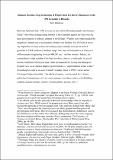Intimate enemies : representations of perpetrators in literary responses to the 1994 genocide in Rwanda
Abstract
Hitchcott examines the representation of genocide perpetrators in fictional responses to the 1994 Genocide against the Tutsi in Rwanda. Through analysis of texts by African authors, most of them from Rwanda, the chapter considers how authors and readers often find themselves in a position of moral ambivalence in relation to these imagined perpetrators of genocide. Hitchcott shows how questions of empathy and judgement are raised in works of fiction, pushing readers to explore the complexities of the multiple failures of humanity that culminated in the most efficient genocide of the twentieth century. Ultimately, the chapter suggests that fiction invites us to reconsider our moral categories by asking ourselves what we would have done in such extraordinary circumstances.
Citation
Hitchcott , N 2018 , Intimate enemies : representations of perpetrators in literary responses to the 1994 genocide in Rwanda . in C Bielby & J Stevenson Murer (eds) , Perpetrating Selves : Doing Violence, Performing Identity . Palgrave Macmillan , pp. 155-176 . https://doi.org/10.1007/978-3-319-96785-1_8
Publication
Perpetrating Selves
Status
Peer reviewed
Type
Book item
Collections
Items in the St Andrews Research Repository are protected by copyright, with all rights reserved, unless otherwise indicated.

